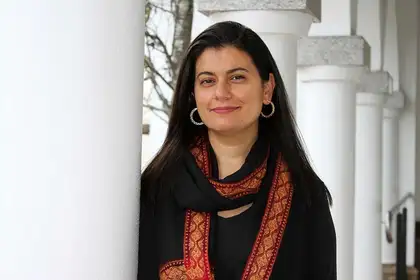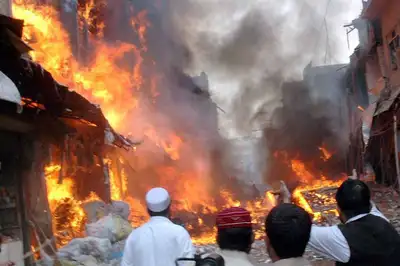
Doctoral candidate Fatima Junaid's thesis investigates the effects of job stress and post-traumatic stress disorder on employee behaviours.
By Fatima Junaid.
As a child, I grew up in a safe world. I grew up in Pakistan. I played outside my house and went to school on my own as a child. When I was seven, my father worked on a construction project in a foreign country; we lived with our mother in our house. She never feared for our safety, nor did we because there was nothing to fear except, perhaps, some small-scale thieves. That was my country and my neighbourhood where we lived normal lives.
Later, when I went to university, I travelled with my friend in her car or in a cab alone. We didn’t have to cover our heads. We had a choice. Many people covered their heads, I didn’t. And it was ok. This is only 15 years ago.
But then the Twin Towers in USA came down. We started having an ideological demolition. I can’t think of an alternative term to express this. What happened? And how? I can’t say. But in the last 15 years, a lot changed in my city and country. Now, I had to cover my head; my daughter couldn’t play outside the house. I would feel scared taking a cab alone. My child was not growing up in a safe environment. There were these suicide bombers blasting every place that was crowded. Hospitals and parks had armed guards in bullet proof jackets. Schools had barbed wire and 12 foot high walls. Every day, everyone fears for the lives of their loved ones.

Immigrants from countries that suffer from terrorism have particular anxieties.
A new Massey family
Fast forward, in 2013, I got a scholarship to undertake my PhD at Massey University in New Zealand. I came here in September 2014 with my husband and our eight-year-old daughter. When my daughter went to school in Auckland, she felt a little scared because the schools in New Zealand have no walls and no guards. I had to explain to her that’s because it’s a safe place with no bombers.
Many foreigners come to New Zealand to study, to work, or for a better lifestyle. But there is a smaller group who are migrating to find peace for their families and these are not always refugees. They are fleeing terrorism and are willing to earn less money and live less lavish lifestyles compared to what they could have in their home country. Many of these people are unaware of the trauma they bring with them – the fear and the chronic stress they have endured through living under the constant threat of terrorism. Often you speak with them and they will not even be aware of it. I know because I am one of them.
Let me give you an example. After a month of living in New Zealand, I was five minutes late to pick my daughter up from school. When she did not see her mother outside the classroom on the bench, she started crying non-stop. Her teacher couldn’t understand why the child was crying like there was an emergency and I, as a mother, had not seen it coming either. When I got there, I asked her why was she crying and she said, she was scared. Upon my asking, “Scared of what?”, she was not sure. “Mama, I thought maybe something happened to you.”
I knew the fear was not about me having an accident or leaving her. It was something that she couldn’t express. It has taken her three years to feel safe, she is not aware of the process, or what happened, but she knows and expresses that she feels safe and free. Yet, if I am unexpectedly late for something she still goes into panic mode. Having said that, we are getting better, although we are not entirely there yet.
'You never get used to terrorism'
You never get used to terrorism. In February, 2015 I found out that my father went to a mosque (in Pakistan) to pray, and a suicide bomber blew himself up in that mosque. I lost my father. I felt pain that I had never known or felt before. Something inside me shattered.
I was hurt, sad and broken to the core. I went to Pakistan for his funeral. When I came back to Auckland, my family tried to help me, while grieving themselves. But we all were in pain, and it was hard to deal with. If I have been able to move on, it is because of my supervisors and colleagues, the university counselling services, my landlords, friends and their families. I am continuing with my degree and my research – and for this, I cannot thank everyone in New Zealand who has helped me enough.
The burden that comes with trauma and fear is one that is not widely known in New Zealand – and long may it stay that way. As more migrants join New Zealand’s workplaces and communities, an awareness of these issues is important for the better wellbeing of everyone. There needs to be dialogue regarding the difference between migrants from peaceful countries and those from countries afflicted by terror – but only in the sense of providing early diagnosis of post-traumatic stress syndrome and ongoing support. This will mean New Zealand can truly benefit from the skills and knowledge of these migrants, all of whom are grateful to be here.
Fatima Junaid is a doctoral candidate with the Massey Business School. Her thesis investigates the effects of job stress and post-traumatic stress disorder on employee behaviours.